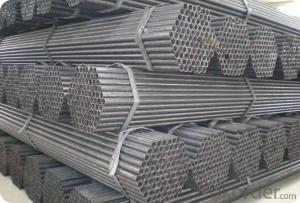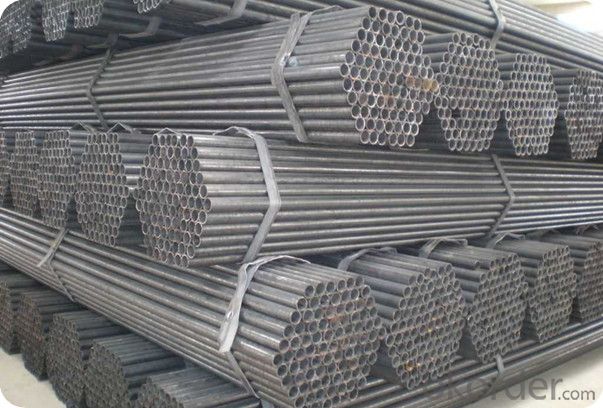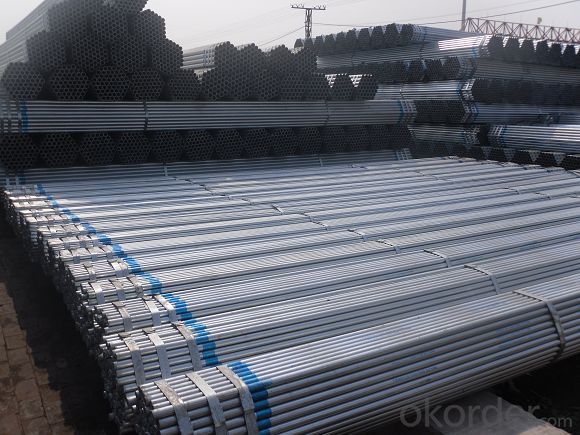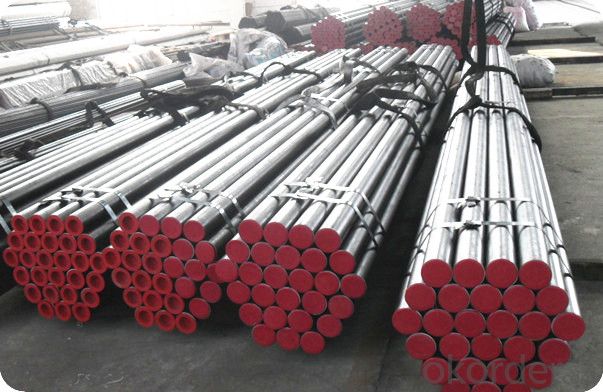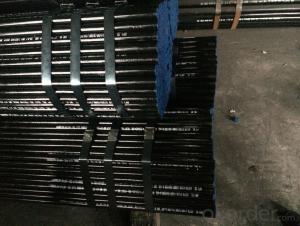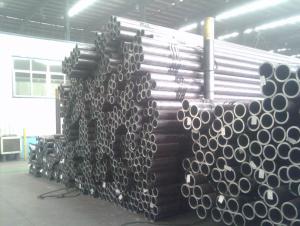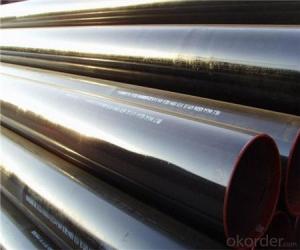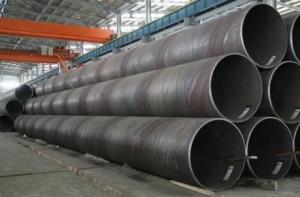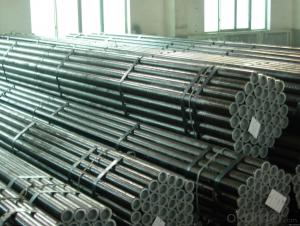Welded Steel Pipe API SPEC 5CT Steel Pipe API for Gas Water Conveying
- Loading Port:
- China Main Port
- Payment Terms:
- TT or LC
- Min Order Qty:
- 30 m.t.
- Supply Capability:
- 6500 m.t./month
OKorder Service Pledge
OKorder Financial Service
You Might Also Like
1、Structure of Welded Black ERW Steel Pipe 5L 5 CT :
Welded Black ERW Steel Pipe 5L 5 CT is electric resistance welding, the abbreviation for ERW for transporting oil and natural gas vapor liquid objects, can meet the requirements of high and low pressure, the transport in the world with pipe sector accounted for a pivotal position.With sound reputation and high quality , we will offer clients a wonderful business experience.
2、Main Features of Welded Black ERW Steel Pipe 5L 5 CT :
• High manufacturing accuracy
• High strength
• Good visual effect
• Good view and appearance
• Good shape
• Reasonable price
• Small inertia resistance
• Strong heat dissipation ability
3、Welded Black ERW Steel Pipe 5L 5 CT Specification:
Standard | GB, DIN, ASTM ASTM A106-2006, ASTM A53-2007 |
Grade | 10#-45#, 16Mn 10#, 20#, 45#, 16Mn |
Thickness | 1 - 33 mm |
Section Shape | Round |
Outer Diameter | 21 - 610mm |
Place of Origin | Tianjin, China (Mainland) |
Secondary Or Not | Non-secondary |
Application | Hydraulic Pipe |
Technique | Cold Drawn |
Certification | API |
Surface Treatment | factory state or painted black |
Special Pipe | API Pipe |
Alloy Or Not | Non-alloy |
Length | 5-12M |
Outer Diameter | 21.3-610mm |
Grade | 20#, 45#, Q345, API J55, API K55, API L80, API N80, API P110, A53B |
Standard | ASME, ASTM |
1) Material:20#(ASTM A 106/A53 GRB.API5LGRB,GB),45#,16Mn,10#.
2) Specification range:OD:21.3-610mm,WT:6-70mm,length:6-12m or according to the requirement of clients.
3) Excutive standards:GB,ASME API5L.ASTM A 106/A53,Despite of the above standards,we can also supply seamless steel pipe with standard of DIN,JIS,and so on,and also develop new products according to the requirements of our clients!
4) Surface:black lacquered,varnish coating or galvanized.
4、Packaging & Delivery
Packaging Details: | seaworthy package,bundles wrapped with strong steel strip |
Delivery Detail: | 15-30days after received 30%TT |
5、FAQ of Welded Black ERW Steel Pipe 5L 5 CT :
①How is the quality of your products?
Our products are manufactured strictly according to national and internaional standard, and we take a test
on every pipe before delivered out. If you want see our quality certifications and all kinds of testing report, please just ask us for it.
Guaranteed: If products’ quality don’t accord to discription as we give or the promise before you place order, we promise 100% refund.
③Why should you chose us?
Chose happens because of quality, then price, We can give you both.Additionally, we can also offer professional products inquiry, products knowledge train(for agents), smooth goods delivery, exellent customer solution proposals.Our service formula: good quality+good price+good service=customer’s trust
SGS test is available, customer inspection before shipping is welcome, third party inspection is no problem.
6、 Welded Black ERW Steel Pipe 5L 5 CT Images:
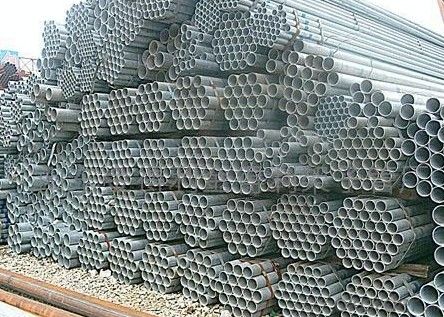
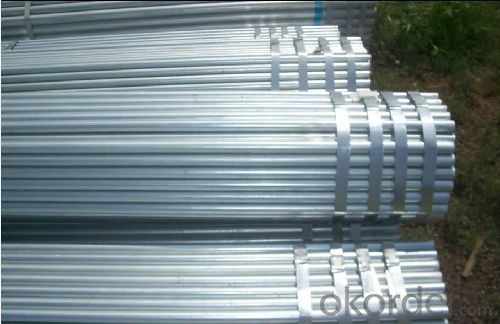
- Q: Can steel pipes be used in plumbing systems?
- Yes, steel pipes can be used in plumbing systems. Steel pipes have been traditionally used in plumbing systems for their durability, strength, and resistance to corrosion. However, other materials like copper and plastic pipes have become more popular in recent years due to their ease of installation, lower cost, and better resistance to certain types of corrosion.
- Q: What is the purpose of a steel pipe coating?
- The purpose of a steel pipe coating is to provide a protective layer that prevents corrosion and extends the lifespan of the pipe. It also enhances the pipe's resistance to various environmental factors and improves its overall performance.
- Q: What are the different types of supports used for aboveground steel pipes?
- There are several types of supports commonly used for aboveground steel pipes, including pipe hangers, pipe clamps, pipe saddles, and pipe shoes. These supports are designed to provide stability and prevent excessive movement or vibration of the pipes, ensuring their proper alignment and preventing damage.
- Q: What are the different methods of repairing damaged steel pipes?
- There are several methods of repairing damaged steel pipes, including welding, epoxy lining, pipe bursting, and pipe relining. Welding involves joining the damaged sections of the pipe together using heat, while epoxy lining involves applying a protective coating to the inner surface of the pipe. Pipe bursting involves replacing the damaged pipe with a new one by pulling it through the existing pipe, and pipe relining involves inserting a new liner into the damaged pipe to create a new, seamless pipe within the existing one. The choice of method depends on factors such as the extent of damage, accessibility, and cost-effectiveness.
- Q: How are steel pipes used in the manufacturing of HVAC systems?
- Steel pipes are commonly used in the manufacturing of HVAC systems due to their durability, strength, and heat resistance. They are used to transport fluids, such as water and refrigerant, throughout the system. Steel pipes also provide structural support for the overall HVAC system, ensuring its stability and reliability.
- Q: How are steel pipes used in the construction of natural gas power plants?
- Steel pipes are used in the construction of natural gas power plants for various purposes such as transporting natural gas from the source to the plant, distributing gas within the facility, and carrying exhaust gases away from the plant. They are essential for maintaining a safe and efficient flow of natural gas throughout the power plant's infrastructure.
- Q: What are the different methods of pipe threading for steel pipes?
- The different methods of pipe threading for steel pipes include manual threading, machine threading, and electric threading. Manual threading involves using a handheld die or tap to create the threads on the pipe. Machine threading utilizes power-driven machines that can thread multiple pipes simultaneously, offering efficiency and accuracy. Electric threading is similar to machine threading, but it uses an electric motor to drive the threading process.
- Q: How are steel pipes used in the manufacturing of shipbuilding?
- Steel pipes are widely used in shipbuilding for various purposes such as the transportation of fluids, gases, and air systems, as well as structural applications. They are commonly used for the construction of ship hulls, bulkheads, and decks, providing strength and durability to withstand the harsh marine environment. Steel pipes are also used in the installation of various systems onboard, including fuel, water, and sewage systems, as well as ventilation and firefighting systems. Overall, steel pipes play a vital role in the construction and operation of ships, ensuring their functionality and safety.
- Q: How seamless steel tube is formed?
- Hot drawing or cold drawing. The so-called cold is the billet from the thick wall tube is not heated, oil lubrication, with a steel sleeve inside, gradually elongated. Hot drawing is to make the billet tube red, do such work, generally thick wall applicable.
- Q: What are the different methods of protecting steel pipes from corrosion?
- There are several methods of protecting steel pipes from corrosion, including: 1. Coatings: Applying protective coatings such as epoxy, polyethylene, or zinc to the surface of the steel pipes can create a barrier against corrosive elements. 2. Cathodic Protection: This method involves installing sacrificial anodes or impressed current systems to provide a protective current that counteracts the corrosion process. 3. Corrosion Inhibitors: Adding chemicals or inhibitors to the fluid or environment surrounding the pipes can reduce the rate of corrosion. 4. Internal Linings: Applying internal linings made of resin, cement, or other materials can protect the inner surface of the pipes from corrosion caused by the transported fluid. 5. Design Considerations: Implementing proper design practices like avoiding sharp bends and crevices, ensuring proper drainage, and using corrosion-resistant alloys can help prevent corrosion in steel pipes.
Send your message to us
Welded Steel Pipe API SPEC 5CT Steel Pipe API for Gas Water Conveying
- Loading Port:
- China Main Port
- Payment Terms:
- TT or LC
- Min Order Qty:
- 30 m.t.
- Supply Capability:
- 6500 m.t./month
OKorder Service Pledge
OKorder Financial Service
Similar products
Hot products
Hot Searches
Related keywords
